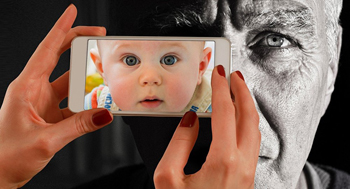Dec 17: Wrinkles, grey hair and niggling aches are normally regarded as an inevitable part of growing older, but now scientists claim that the ageing process may be reversible.
 The team showed that a new form of gene therapy produced a remarkable rejuvenating effect in mice. After six weeks of treatment, the animals looked younger, had straighter spines and better cardiovascular health, healed quicker when injured, and lived 30% longer.
The team showed that a new form of gene therapy produced a remarkable rejuvenating effect in mice. After six weeks of treatment, the animals looked younger, had straighter spines and better cardiovascular health, healed quicker when injured, and lived 30% longer.
Juan Carlos Izpisua Belmonte, who led the work at the Salk Institute in La Jolla, California, said: “Our study shows that ageing may not have to proceed in one single direction. With careful modulation, ageing might be reversed.”
The genetic techniques used do not lend themselves to immediate use in humans, and the team predict that clinical applications are a decade away. However, the discovery raises the prospect of a new approach to healthcare in which ageing itself is treated, rather than the various diseases associated with it.
The findings also challenge the notion that ageing is simply the result of physical wear and tear over the years. Instead, they add to a growing body of evidence that ageing is partially – perhaps mostly – driven by an internal genetic clock that actively causes our body to enter a state of decline.
The scientists are not claiming that ageing can be eliminated, but say that in the foreseeable future treatments designed to slow the ticking of this internal clock could increase life expectancy.
“We believe that this approach will not lead to immortality,” said Izpisua Belmonte. “There are probably still limits that we will face in terms of complete reversal of ageing. Our focus is not only extension of lifespan but most importantly health-span.”
Wolf Reik, a professor of epigenetics at the Babraham Institute, Cambridge, who was not involved in the work, described the findings as “pretty amazing” and agreed that the idea of life-extending therapies was plausible. “This is not science fiction,” he said.
The rejuvenating treatment given to the mice was based on a technique that has previously been used to “rewind” adult cells, such as skin cells, back into powerful stem cells, very similar to those seen in embryos. These so-called induced pluripotent stem (iPS) cells have the ability to multiply and turn into any cell type in the body and are already being tested in trials designed to provide “spare parts” for patients.
The latest study is the first to show that the same technique can be used to partially rewind the clock on cells – enough to make them younger, but without the cells losing their specialised function.
“Obviously there is a logic to it,” said Reik. “In iPS cells you reset the ageing clock and go back to zero. Going back to zero, to an embryonic state, is probably not what you want, so you ask: where do you want to go back to?”
The treatment involved intermittently switching on the same four genes that are used to turn skin cells into iPS cells. The mice were genetically engineered in such a way that the four genes could be artificially switched on when the mice were exposed to a chemical in their drinking water.
The scientists tested the treatment in mice with a genetic disorder, called progeria, which is linked to accelerated ageing, DNA damage, organ dysfunction and dramatically shortened lifespan.
After six weeks of treatment, the mice looked visibly younger, skin and muscle tone improved and they lived 30% longer. When the same genes were targeted in cells, DNA damage was reduced and the function of the cellular batteries, called the mitochondria, improved.
“This is the first time that someone has shown that reprogramming in an animal can provide a beneficial effect in terms of health and extend their lifespan,” said Izpisua Belmonte.
Crucially, the mice did not have an increased cancer risk, suggesting that the treatment had successfully rewound cells without turning them all the way back into stem cells, which can proliferate uncontrollably in the body.
The potential for carcinogenic side-effects means that the first people to benefit are likely to be those with serious genetic conditions, such as progeria, where there is more likely to be a medical justification for experimental treatments. “Obviously the tumour risk is lurking in the background,” said Reik.
The approach used in the mice could not be readily applied to humans as it would require embryos to be genetically manipulated, but the Salk team believe the same genes could be targeted with drugs.
“These chemicals could be administrated in creams or injections to rejuvenate skin, muscle or bones,” said Izpisua Belmonte. “We think these chemical approaches might be in human clinical trials in the next ten years.”
The findings are published in the journal Cell.






Comments
Add new comment